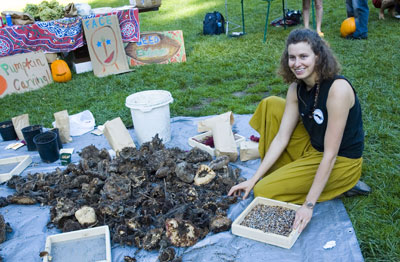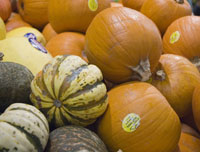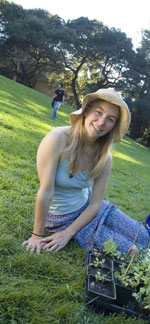Berkeleyan
 |
At the Nov. 7 Harvest Festival in Faculty Glade, Severine Fleming, founder of SAFE, taught other students about the importance of saving seeds. (BAP photos) |
Celebrating Thanksgiving, Berkeley-style
Many on campus are learning about where their food comes from - and getting up close and personal with it
| 16 November 2006
We are a well-fed but badly nourished nation. The signs are unmistakable: an epidemic of obesity and diabetes, antibiotic-resistant strains of E. coli, "blue baby" alerts in rural areas where water supplies are polluted with nitrates from fertilizer runoff, to name but a few.
And yet it's also a great time for eating, especially if you live in or near Berkeley, the birthplace of the current food revolution. Berkeley alumna Alice Waters '67 first championed fresh, locally grown food in the 1970s at Chez Panisse and continues to spread its gospel through her nationwide education project, the Edible Schoolyard. Science writer Michael Pollan, a professor at the Graduate School of Journalism, is a major figure as well: his recent book The Omnivore's Dilemma opened many eyes to the long, winding, and petroleum-soaked route that most food takes to our plates.
The revolution is about shortening that distance, both geographically and cognitively. It's about learning where what you eat comes from, and who grows or raises it and how. In practice, it's about seeking out food that is sustainable (benefiting not just producer and consumer but the community and environment as well), organic, (grown without pesticides, chemical fertilizers, hormones, or antibiotics), local (farmed within 100 miles), and ethical (humanely raised and slaughtered animals, living wages for workers).
That's a mouthful, right? Some call it SOLE food, for short.
 Getting on the SOLE train Every supermarket near campus is offering a variety of (in ascending order of cost) free range, organic, and/or heritage turkeys. All are from California farms and must be ordered in advance, with the exception of Berkeley Bowl's heritage turkeys, which went on sale on a first-come, first-served basis on Thursday, Nov. 16, and will almost surely be sold out by the time you read this. (Last year's allotment was gone in 30 minutes.) With more notice, Bay Area residents can also order heritage turkeys from small local operations like Clark Summit Farms, where Liz Cunninghame just finished raising some 50 heritage birds on pasture in Tomales — all spoken for well in advance. Turkey hunting around Berkeley Andronico's: Willie Bird (FR, O), Zacky (FR), Branigan (FR). Order by Monday 11/21. Pumpkins, sweet potatoes, and beans for the traditional side dishes are all in season right now, as are apples and Brussels sprouts: Look for them at farmers markets in Berkeley (Tuesday, Thursday, and Saturday) and Oakland (Grand Lake on Saturday, Temescal on Sunday). If you prefer one-stop shopping, both Whole Foods and Berkeley Bowl have a large selection of these organic fruits and vegetables from local farms. It's significantly more expensive, and time-consuming, to chew the right thing. But price and convenience don't have to top the list of a food's values. Few would disagree that most U.S. food is artificially cheap, with rural communities shouldering the burden of the costs of pollution, the health system paying the costs of obesity, and taxpayers subsidizing commodity crops like corn and soybeans. Truth is, cooking "from scratch" with quality ingredients usually ends up being competitive on a per-pound basis with say, the cost of canned cranberry sauce or a storebought pumpkin pie — not to mention tastier. |
Thanksgiving, the kick-off to the holiday feasting marathon, seemed like the ideal time to talk to students, staff, and faculty who are making an effort to eat more consciously.
Beyond voting with a fork
If the campus's nascent food movement has a Mario Savio, it would be Severine von Tscharner Fleming. The fourth-year conservation major has been instrumental in galvanizing her fellow students to "eat their views," although probably not her views: The intense 25-year-old Fleming eats roadkill deer and raises rabbits for meat.
A transfer student from Pomona College, where she helped start a student organic garden, Fleming took three years off between Pomona and Berkeley for a self-guided tour of the world's agricultural practices, working on farms in Switzerland, Australia, South Africa, New Zealand, and elsewhere. As soon as she enrolled here in fall 2005, she founded the student group Society for Agriculture and Food Ecology (SAFE) and began making connections among sustainability-minded student groups.
Fleming is a passionate, charismatic advocate for the importance not just of supporting local farmers but of joining them. "Michael Pollan, [last year's visiting nutrition professor] Marian Nestle, and Alice Waters are definitely the gurus, and we have a lot of guru worship around in Berkeley. But," she warns, "we can't just turn everything into a consumer dialogue — 'Buy fresh and buy local.' If it's just a purchasing choice, then you're not reforming the system. We have to be fresh and be local."
Through SAFE's "Future Food Careers" series she has enticed 23 female speakers — farmers, authors, ethnobotanists, organic vintners — to come to campus. The goal, she says, is "recruiting for a regenerative movement, to validate these professions and show students there are all these different avenues" to make a difference in the food system.
Misha Bailey, a fifth-year major in Conservation and Resource Studies and a member of the Student Organic Garden Association, is already a convert. While taking a course on urban gardening in spring 2004, she recalls, "I realized that I wanted to get my hands dirty and learn to grow my own food." So she left school for a semester and worked on a farm in Ecuador, where she helped a family grow its own food and sugar cane.
She also helped slaughter and butcher chickens: "I'd had romantic ideas about wanting to do that stuff before. It was bloody, but it wasn't gross. They ate every single thing. We chewed on the feet, ate the stomach, intestines, and everything."
Yet if Bailey had her druthers, she'd be having a meatless Thanksgiving this year. While she's not a vegetarian, she eats very little meat, all of it free range and local: she will not support the "abominable conditions" typical of factory farms. (Poultry is exempt from USDA humane-slaughtering laws, and most poultry is raised in crowded confinement, debeaked, and fed animal byproducts.)
But Bailey can't choose what she'll be eating next Thursday: For the past few years her parents have begun buying an entire precooked Thanksgiving dinner from their local Whole Foods, including a free-range turkey.
"In 20 years I hope to raise my own turkeys to eat for Thanksgiving," says Bailey. "That'll be cool."
Sharon Page-Medrich, assistant to the dean of the Graduate Division, won't get to choose her Thanksgiving dinner either. Her relatives buy a kosher turkey for certain family members, but philosophical preferences don't receive the same deference. Long interested in issues of sustainability, she now buys only sustainable, organic meats and eggs, and mostly organic produce.
"I'm not always consistent," she admits. "It requires a very conscientious effort to go out of one's way and to pay more. But I think that being willing to pay a premium makes one more conscious of the choices we make on many levels. It may lead to lesser quantity in favor of better quality, which would be healthier."
Flocking to free-range
Somewhat to the surprise of Cal Dining officials, even notoriously frugal students are willing to spend more for the higher-priced organic offerings at the weekly Sproul Plaza produce stand. "Organic is a huge trend on this campus," says Cal Dining Director Shawn LaPean.
 Conservation major Misha Bailey showed off seedlings grown by the Student Organic Garden Association. |
Students like Bailey look elsewhere for better bargains, such as at farmers markets just before closing time. "Buying organic doesn't have to be expensive," argues Bailey. "Some people argue that it's inconvenient to go to the farmers market, but the ones in Oakland are a lot cheaper than, say, Safeway, with its really expensive organic lettuce."
Responding to demand, Cal Dining has begun offering organic eggs (from cage-free hens). Spring might bring organic milk; Cal Dining executive chef Chuck Davies is also talking to Diestel Turkey Ranch and Petaluma Poultry about phasing in some organic meat products, and to Marin Organics about bringing in more local produce.
For his own Thanksgiving dinner, Davies has ordered a heirloom* bird from Diestel to roast at his parents' home in Oregon. "They're grown, processed, and distributed locally by the family themselves, and I believe in supporting that. I also think that free-range turkeys just taste better."
(When applied to turkeys, the term "heritage" refers to eight historic American sub-breeds that mate naturally, live longer, and grow at a slow-to-moderate rate. Those traits are in stark contrast to the Broad-Breasted Whites that have dominated sales since the '60s, which are bred to grow fast, with breasts so big that they can't walk properly or reproduce naturally.)
And though Pollan must be bone-weary of people asking him what he's having for dinner, he e-mailed that he was going to his sister-in-law's for Thanksgiving, where he will "happily eat whatever she and her husband cook." He is, however, bringing his own bird. Not just any turkey, but one he bought at auction in a fundraiser for Denise O'Brien, an organic farmer who ran an outsider campaign for Iowa's secretary of agriculture from a biodiesel-powered schoolbus.
"She lost, unfortunately, but her organic free-range turkey is coming my way," wrote Pollan. "It's not local, true, but we can't be zealots."
Those who care where their food comes from try to educate, not preach, so as to avoid getting tagged with the dread "food police" label or others. Bailey complains that classmates with careers on their minds call her "a hippie," saying she's out of touch with the real world.
"Which I'm not. I think the real world is out of touch with our food."
Powell, along with campus graphic designer Kathryn Bader and four others, in May launched a food-politics blog called The Ethicurean about their adventures trying to "chew the right thing": www.ethicurean.com.
*Note: The print version of this story reported inaccurately that Diestel Turkey Ranch sells heritage turkeys. The company actually sells "heirloom," the Orlop strain of Broad-Breasted Bronze turkey — a predecessor of the Broad Breasted White.

